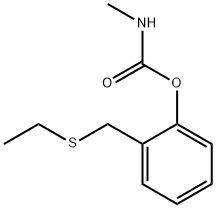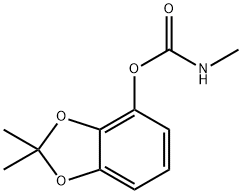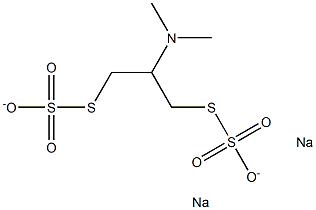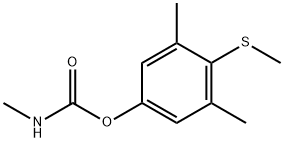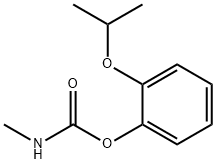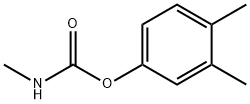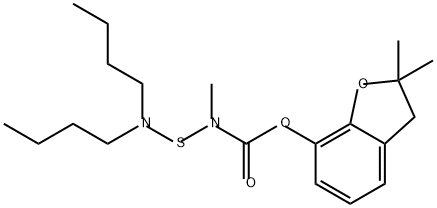Ethyl 2-(4-phenoxyphenoxy)ethylcarbamate
- CAS NO.:72490-01-8
- Empirical Formula: C17H19NO4
- Molecular Weight: 301.34
- MDL number: MFCD00144303
- EINECS: 276-696-7
- SAFETY DATA SHEET (SDS)
- Update Date: 2024-12-18 14:07:02

What is Ethyl 2-(4-phenoxyphenoxy)ethylcarbamate?
Description
Fenoxycarb is a non-neurotoxic carbamate insecticide that acts as an insect growth regulator via juvenile hormone-like activity. It inhibits terminal development of first instar and newly transformed second instar nymphs of Florida red scale (C. aonidum) when used at a concentration of 0.0125% AI. Fenoxycarb (5 and 10 mg AI/colony) reduces the colony size index of laboratory colonies of red imported fire ants (S. invicta) by 93.6 to 95.9% at 8 weeks post-treatment. It is toxic to D. magna (LC50 = 0.5 mg a.s./L) and fish including O. mykiss, L. macrochirus, C. carpio, I. punctatus, and C. variegatus (LC50s = 0.66-1.5 mg a.s./L), but is not toxic to rats (LD50 = >10,000 mg/kg). Fenoxycarb is also an antagonist of α4β40-, α4β2-, α3β4-, and α3β2-containing rat nicotinic acetylcholine receptors (nAChRs; IC50s = 3, 2.4, 1.8, and 7.6 μM, respectively) but not rat brain acetylcholinesterase (AChE; IC50 = >1,000 μM).
Chemical properties
Colorless crystalline
The Uses of Ethyl 2-(4-phenoxyphenoxy)ethylcarbamate
Insecticide.
The Uses of Ethyl 2-(4-phenoxyphenoxy)ethylcarbamate
Fenoxycarb is a carbamate insect growth regulator by preventing immature insects from reaching maturity by mimicking juvenile hormone.
Definition
ChEBI: Fenoxycarb is a carbamate ester that is the O-ethyl carbamate of 2-(4-phenoxyphenoxy)ethylamine. It has a role as a juvenile hormone mimic, an environmental contaminant, a xenobiotic and an insecticide. It is an aromatic ether and a carbamate ester. It is functionally related to a 4-phenoxyphenol.
What are the applications of Application
Fenoxycarb is a carbamate insect growth regulator
General Description
White crystalline solid. Selective insecticide.
Air & Water Reactions
Slightly water soluble.
Reactivity Profile
Ethyl 2-(4-phenoxyphenoxy)ethylcarbamate is a carbamate ester. Carbamates are chemically similar to, but more reactive than amides. Like amides they form polymers such as polyurethane resins. Carbamates are incompatible with strong acids and bases, and especially incompatible with strong reducing agents such as hydrides. Flammable gaseous hydrogen is produced by the combination of active metals or nitrides with carbamates. Strongly oxidizing acids, peroxides, and hydroperoxides are incompatible with carbamates.
Flammability and Explosibility
Not classified
Agricultural Uses
Insecticide, Miticide: Fenoxycarb is an insect growth regulator, sex attractant, or feeding stimulant. It is intended to be used to inhibit metamorphosis of juvenile insects to the adult stage. It is used as bait to control a broad spectrum of insects on olives, vines, fruit, cotton, and stored products. It is used to control fire ants, cockroaches, mosquitos, beetles, moths, scale and sucking insects.
Trade name
AWARD; ABG 6215; ACR®-2984 F; ACR® 2913; BASUS®[C]; COMPLY®; ECTOGARD®[C]; ELIMINATOR®[C]; INSEGAR®; LogIC®; LUFOX®; PICTYL®; PRECISION®; TORUS®[C]; RO 13-5223®; VARIKILL®
Properties of Ethyl 2-(4-phenoxyphenoxy)ethylcarbamate
| Melting point: | 53-54° |
| Boiling point: | 442.47°C (rough estimate) |
| Density | 1.1222 (rough estimate) |
| vapor pressure | 0Pa at 25℃ |
| refractive index | 1.5400 (estimate) |
| Flash point: | 224 °C |
| storage temp. | Store at -20°C |
| solubility | 4.6g/L in organic solvents at 20 ℃ |
| form | neat |
| pka | 12.13±0.46(Predicted) |
| Water Solubility | 7.9mg/L at 25℃ |
| BRN | 6932817 |
| EPA Substance Registry System | Fenoxycarb (72490-01-8) |
Safety information for Ethyl 2-(4-phenoxyphenoxy)ethylcarbamate
| Signal word | Warning |
| Pictogram(s) |
 Health Hazard GHS08  Environment GHS09 |
| GHS Hazard Statements |
H351:Carcinogenicity H410:Hazardous to the aquatic environment, long-term hazard |
| Precautionary Statement Codes |
P201:Obtain special instructions before use. P202:Do not handle until all safety precautions have been read and understood. P273:Avoid release to the environment. P280:Wear protective gloves/protective clothing/eye protection/face protection. P391:Collect spillage. Hazardous to the aquatic environment P308+P313:IF exposed or concerned: Get medical advice/attention. |
Computed Descriptors for Ethyl 2-(4-phenoxyphenoxy)ethylcarbamate
New Products
Tert-butyl bis(2-chloroethyl)carbamate 4-Methylphenylacetic acid N-Boc-D-alaninol N-BOC-D/L-ALANINOL 3-Morpholino-1-(4-nitrophenyl)-5,6-dihydropyridin- 2(1H)-one Furan-2,5-Dicarboxylic Acid Tropic acid 1,1’-CARBONYLDIIMIDAZOLE DIETHYL AMINOMALONATE HYDROCHLORIDE R-2-BENZYLOXY PROPIONIC ACID 1,1’-CARBONYLDI (1,2-4 TRIAZOLE) N-METHYL INDAZOLE-3-CARBOXYLIC ACID (2-Hydroxyphenyl)acetonitrile 4-Bromopyrazole 5-BROMO-2CYANO PYRIDINE 5,6-Dimethoxyindanone 5-broMo-2-chloro-N-cyclopentylpyriMidin-4-aMine 2-(Cyanocyclohexyl)acetic acid 4-methoxy-3,5-dinitropyridine 2-aminopropyl benzoate hydrochloride 1-(4-(aminomethyl)benzyl)urea hydrochloride diethyl 2-(2-((tertbutoxycarbonyl)amino) ethyl)malonate tert-butyl 4- (ureidomethyl)benzylcarbamate Ethyl-2-chloro((4-methoxyphenyl)hydrazono)acetateRelated products of tetrahydrofuran
You may like
-
 Fenoxycarb CAS 72490-01-8View Details
Fenoxycarb CAS 72490-01-8View Details
72490-01-8 -
 1975-50-4 98%View Details
1975-50-4 98%View Details
1975-50-4 -
 2-HYDROXY BENZYL ALCOHOL 98%View Details
2-HYDROXY BENZYL ALCOHOL 98%View Details
90-01-7 -
 2-Chloro-1,3-Bis(Dimethylamino)Trimethinium Hexafluorophosphate 221615-75-4 98%View Details
2-Chloro-1,3-Bis(Dimethylamino)Trimethinium Hexafluorophosphate 221615-75-4 98%View Details
221615-75-4 -
 61397-56-6 CIS BROMO BENZOATE 98%View Details
61397-56-6 CIS BROMO BENZOATE 98%View Details
61397-56-6 -
 14714-50-2 (2-Hydroxyphenyl)acetonitrile 98+View Details
14714-50-2 (2-Hydroxyphenyl)acetonitrile 98+View Details
14714-50-2 -
 118753-70-1 98+View Details
118753-70-1 98+View Details
118753-70-1 -
 733039-20-8 5-broMo-2-chloro-N-cyclopentylpyriMidin-4-aMine 98+View Details
733039-20-8 5-broMo-2-chloro-N-cyclopentylpyriMidin-4-aMine 98+View Details
733039-20-8
